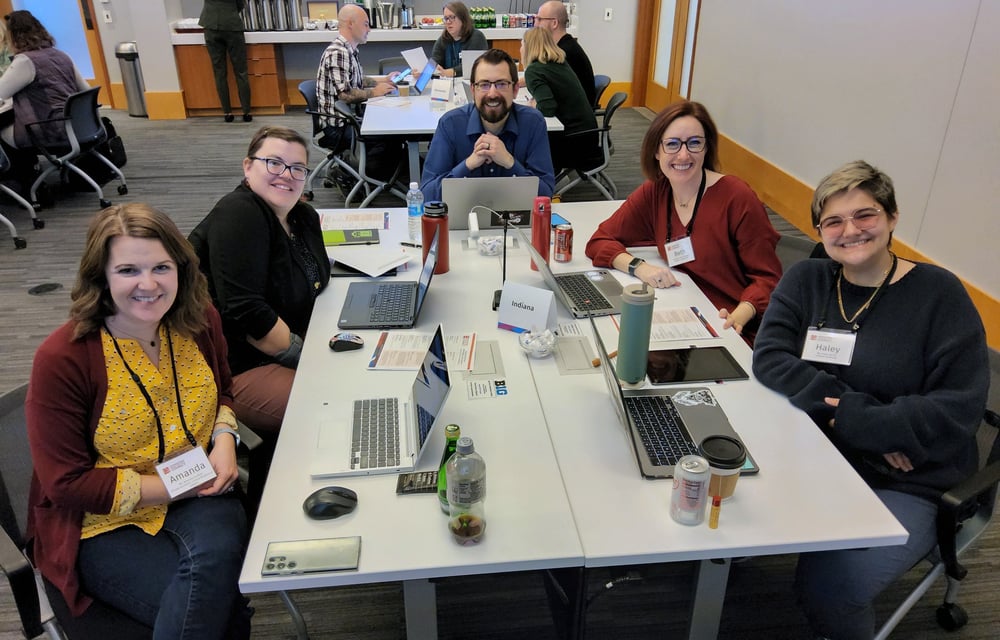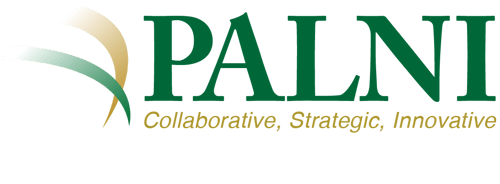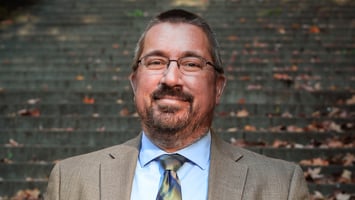On March 18, 2019, campus leaders of the PALSave: PALNI Affordable Learning program attended a...
Propelling open education forward: PALNI and partners convene for MHEC summit
 Members of the Midwestern Higher Education Compact Indiana State Action Team gather during the 2024 MHEC Open Education Summit (left to right: Amanda Hurford, Andrea Bearman, Marc Nash, Beth Daniel Lindsay, and Haley Norris). Photo courtesy of MHEC.
Members of the Midwestern Higher Education Compact Indiana State Action Team gather during the 2024 MHEC Open Education Summit (left to right: Amanda Hurford, Andrea Bearman, Marc Nash, Beth Daniel Lindsay, and Haley Norris). Photo courtesy of MHEC.
With nearly a third of instructors opting for Open Educational Resources (OER) in their classrooms, both usage and awareness of OER are at an all-time high. That’s great news for students who no longer have to foot the bill for certain course materials.
Yet, widespread adoption and implementation of OER still has its challenges. From quality concerns, to technological barriers, to the time and effort it takes to sustain OER initiatives, addressing obstacles requires a lot of collaboration and support.
Fortunately, programs and partnerships that are committed to carrying the broad use of OER forward are also making strides. The Private Academic Library Network of Indiana (PALNI)’s connection to the Midwestern Higher Education Compact (MHEC), which assists Midwestern states in advancing higher education through interstate collaboration and resource sharing, is one such example. By actively engaging with MHEC and its member organizations, PALNI contributes to the broader mission of making education more affordable and accessible.
Indiana team takes action
MHEC’s Midwestern Open Education Summit has become a pivotal event in the ongoing efforts to promote affordable learning and transform higher education, both regionally and worldwide. Held in Rosemont, Ill. January 23-25, the 2024 summit provided an opportunity for members and state action teams to strategically plan for the future and share guidance on advocacy, open publishing practices, building infrastructure, engaging faculty, and more. It also provided a space to reflect on and celebrate the significant advancements made thus far in open education and its impact on student success.
“The State OER Action Team in Indiana has been one of our most engaged and active teams. Since we started our OER work in 2018, the team has brought a range of folks from the state together to create a community of practice around the use of OER,” says Jenny Parks, Vice President, Policy and Research at MHEC. “The use of OER at independent institutions in Indiana exceeds that of any other Midwestern state. This is largely due to the incredible efforts of PALNI to provide support for faculty at independent institutions. We always use PALNI’s work as a shining example.”
Maintaining momentum
PALNI Scholarly Communications Director Amanda Hurford, who leads the PALSave: PALNI Affordable Learning program, played a crucial role in the summit as a panelist, sharing insights and strategies to "keep the momentum" in the OER movement. The panel’s discussion touched upon building on existing work, fostering engagement among advocates, and strategically expanding teams for future initiatives.
“The conference was such an energizing experience, and very helpful in allowing our state team to connect in person and learn from each other and champions from other states,” Hurford says. “We are so thankful to MHEC for organizing this convening and for fueling OER efforts in the region!”
Engaging experts in OER
Two staff members from PALNI-supported institutions, Andrea Bearman and Beth Daniel Lindsay, also attended the summit as representatives from the Indiana OER State Action Team (the team additionally includes Marc Nash, Director, OER Initiatives, Ivy Tech Community College and Haley Norris, Open Education Librarian, Indiana University Libraries).
Bearman, Director of Instructional Design at Trine University, appreciated the event’s focus on engaging individuals with similar roles. Instructional designers play a pivotal part in OER creation and implementation by collaborating with subject matter experts, integrating open materials into curriculum design, ensuring accessibility and quality, and providing professional development to educators. “I found the summit to be incredibly valuable for connecting with other instructional designers who are fluent in OER, so we could swap strategies and ideas to advance implementation,” Bearman says. “I also appreciated the time to meet with our action team in person, which is not something I had done before the summit. The entire experience was wonderful and I hated to leave!”
“I enjoyed the opportunity to meet with my Indiana teammates, MHEC leadership, and others who are active in the Open Education movement, particularly in the Open Education Network,” says Lindsay, Research and Instruction Librarian at Wabash College and Chair of the Academic Libraries of Indiana Affordable Learning Committee. “I also appreciated the unique format. They sat us with our state teams and gave us several hours of dedicated work time to collect information and contribute to our strategic plans. It was also interesting to hear from the representatives of other states and to meet individuals with similar roles—Andrea with instructional designers, Amanda with program leaders, and myself with librarians.”
PALNI's involvement in the 2024 Midwestern Open Education Summit demonstrates its proactive role in shaping the future of education, not just in Indiana but beyond. By leveraging partnerships and actively participating in initiatives like these, PALNI contributes to a broader movement that seeks to make education more equitable, affordable, and ultimately, more conducive to student success. As the momentum for OER continues to build, the impact of collaborations such as the one between PALNI and MHEC will undoubtedly resonate throughout the educational community, inspiring positive change for years to come.
###
About MHEC
VISION: MHEC members collaborate to address the region’s most pressing challenges in higher education and transform educational opportunities so that people and communities thrive.
MISSION: MHEC brings together midwestern states to develop and support best practices, collaborative efforts, and cost-sharing opportunities. Through these efforts it works to ensure strong, equitable postsecondary educational opportunities and outcomes.
HOW MHEC WORKS: MHEC’s strategic approach highlights member states’ strong desire for collaboration, effectiveness, and efficiency. MHEC believes that collaborative actions informed by research and best practices are the catalyst for improving quality, accessibility, relevance, and affordability of postsecondary educational opportunities. MHEC does this primarily through the following approaches: convenings, programs, research, and cost-savings contracts. Increasingly, MHEC looks to leverage these approaches in conjunction with each other to serve its strategic priorities.
MEMBER STATES: Illinois, Indiana, Iowa, Kansas, Michigan, Minnesota, Missouri, Nebraska, North Dakota, Ohio, South Dakota, and Wisconsin. Visit the MHEC website for more information.
About PALSave: PALNI Affordable Learning
Supported by a Lilly Endowment Inc. grant, PALSave supports student success and retention by fostering the use of Open Educational Resources (OER). The program provides collaborative resources and a framework for OER awareness, education, and engagement. In addition, it funds and supports faculty adoptions of affordable learning materials to enhance the teaching and learning missions of private higher education in Indiana. PALNI-supported campuses are affiliate members of the Open Education Network through this initiative.
Highlights of the program’s successes include:
- $1,921,764 cumulative savings to date, which exceeds the savings goal of $1 million
- $2.2 million in total savings is projected by June 30, 2024
- 747% return on investment with course redesign funds
- $4.22 was saved for every grant dollar spent
- 31,487 students impacted, saving on average $61.03 each
- 99% of students perceive a positive or neutral impact on studies/grades with OER
- 829 faculty reached with educational workshops
- 295 courses transformed
- An overall increase in student success and retention measures, including:
- 45% of redesigned courses showed final grade improvement
- 47% of redesigned courses showed an increase in students receiving a grade of 87% or higher
- 26% of redesigned courses showed a decrease in DFW rate
- 100% of PALNI institutions participating in PALSave
Learn more about PALSave on the PALNI website.
About the Private Academic Library Network of Indiana, Inc. (PALNI)
The Private Academic Library Network of Indiana (PALNI) is a non-profit organization that supports collaboration for library and information services for 24 colleges, universities and seminaries throughout the state. From its inception in 1992, the PALNI collaboration has been a key avenue for its supported institutions to contain costs while providing more effective library services. More recently, PALNI has adopted a model of deep collaboration that pools resources and people as a tool to expand services while keeping costs down. PALNI’s board of directors, composed of all 24 library deans and directors from the supported organizations, convened a Future Framing Task Force in 2019 to address ongoing demographic challenges in higher education. The board has escalated this work in the wake of COVID-19, as the consortium seeks to manage the increased need for online support while reducing costs. Simultaneously, PALNI is expanding collaboration within its institutions and with external library partners to address challenges and build cost-effective services. Visit the PALNI website for more information.


Leave a comment